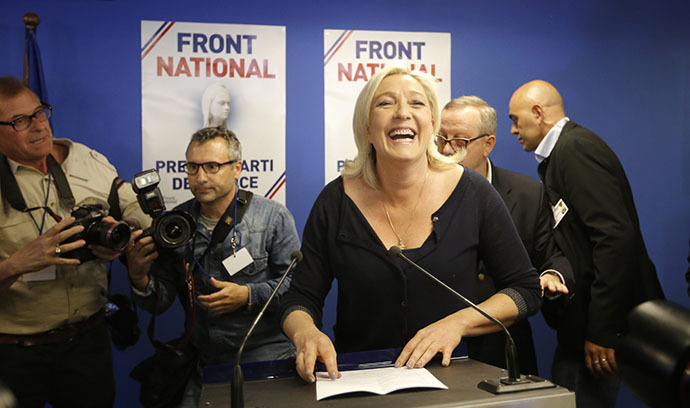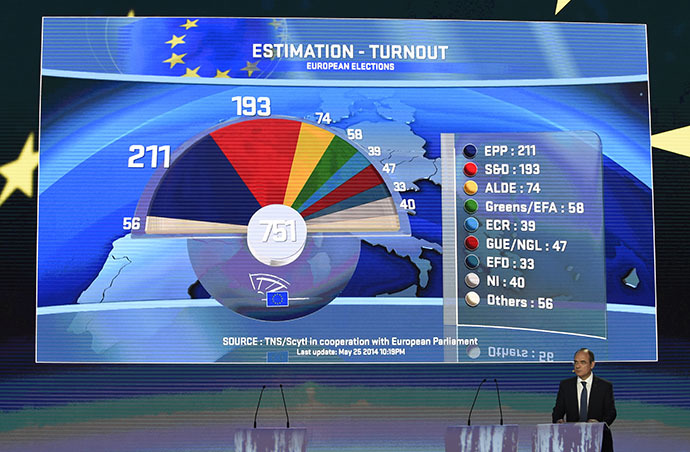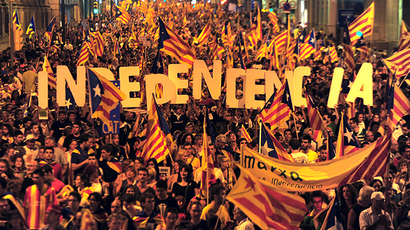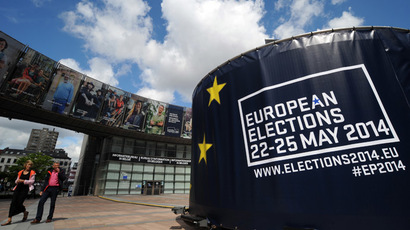‘Political earthquake’: Euroskeptics surge in EU elections
The European parliamentary elections have drawn to a close bringing major gains for both Euroskeptic and Far Right movements. The results have dealt a blow to governments, with the French PM even calling the result "a political earthquake.”
The most major anti-EU public mood was demonstrated in France, where Marine Le Pen's far right National Front scored more than a quarter of the votes cast. Without even waiting for the final figures, French PM Manuel Valls announced on national television that such a result for the anti-EU party was a political “earthquake” for France – and the entire Europe.
"The sovereign people have declared they want to take back the reins of their destiny," said Marine Le Pen. "Our people demand just one politics. The politics of the French, for the French."

There was a similar unprecedented story in the United Kingdom, as the unheralded United Kingdom Independence Party (UKIP) managed to make major gains. The Euroskeptic party's victory marked the first time in modern history that neither Labour nor the Conservatives have won a British national election.
UKIP have enjoyed a rapid rise. 20 years ago, they managed to win just one percent of the vote at their very first European elections, however two decades on, they are set to win around 28 percent. At the last elections five years ago, the party won 16.5 percent.
The party’s leader, Nigel Farage, hailed the result as, “the most extraordinary result in British politics in one hundred years.” This was despite a smear campaign against UKIP being launched by the main stream parties, while the Euroskeptics certainly did not help their own cause with a series of blunders in the run-up to the elections. However, Matthew Goodwin, an associate professor of politics at Nottingham University says, “UKIP support is a lot more resilient that we first thought it was.”
Euroskeptic and far-right parties were also showing gains in Greece and Denmark. Greece’s leftist Syriza, which opposes the austerity measures, was expected to garner 26.7 percent of the vote, beating the center-right New Democracy of Premier Antonis Samaras. At the same time the far-right Golden Dawn party was receiving 9 percent of the vote.
Paolo Raffone, who started the CIPI Foundation Policy Think Tank, spoke to RT and explained why he believes those on the far right of the political spectrum have had such a successful time at these elections.
“This is the consequence of day years of crazy austerity policies that have destroyed the lives of several million people. People became disenchanted with the European Union. Their reaction has been to turn to those leaders at a national level who are proposing a national way out from the EU’s confused way of thinking,” Raffone said.
In Germany, Euroskeptic AfD was getting only 6.8 percent, while according to exit polls Chancellor Angela Merkel's center-right Christian Democratic Union was winning with 36 percent of the vote.

According to preliminary results the center-right European People's Party, led by former Luxembourg Prime Minister Jean-Claude Juncker, was still on track to win the elections and get 212 seats in the European parliament – down from 274 seats. The center-left Socialists and Democrats were projected to grab 185 – down from current 196. The Alliance of Liberals and Democrats was expected to get 71 seats – down from 83.
Although pro-European parties are still holding the vast majority of the seats in the parliament, larger number of anti-EU lawmakers may increase disagreements and complicate passing unpopular measures on which mainstream parties are divided.
Turn-out rates at the elections – an indicator of how engaged the public feels with Europe – remained virtually unchanged from 43 percent back in 2009. However, while some countries showed better turnouts, in others it plummeted – like in Slovakia, where a record low of 13 percent of eligible voters cast their ballots.














